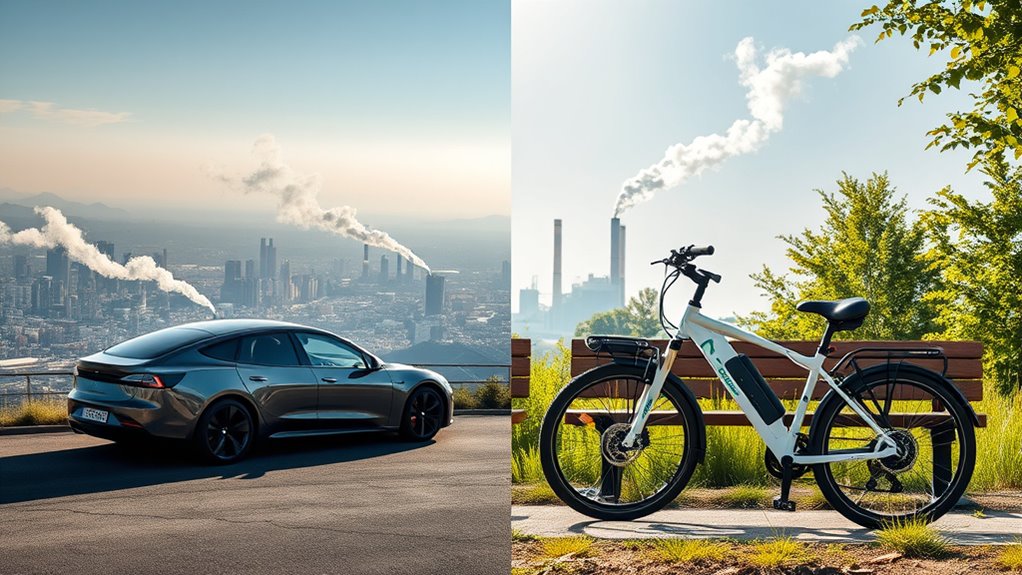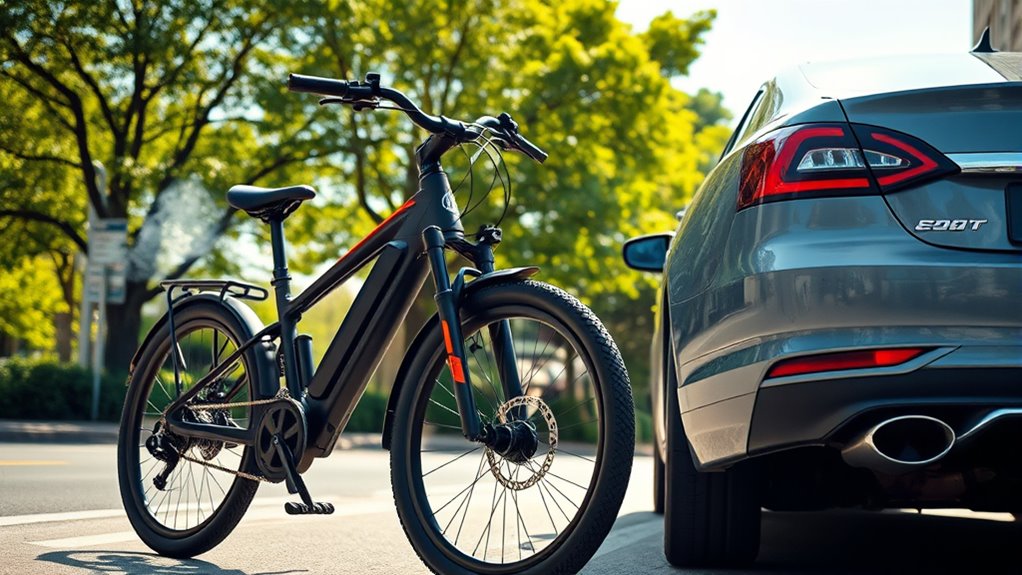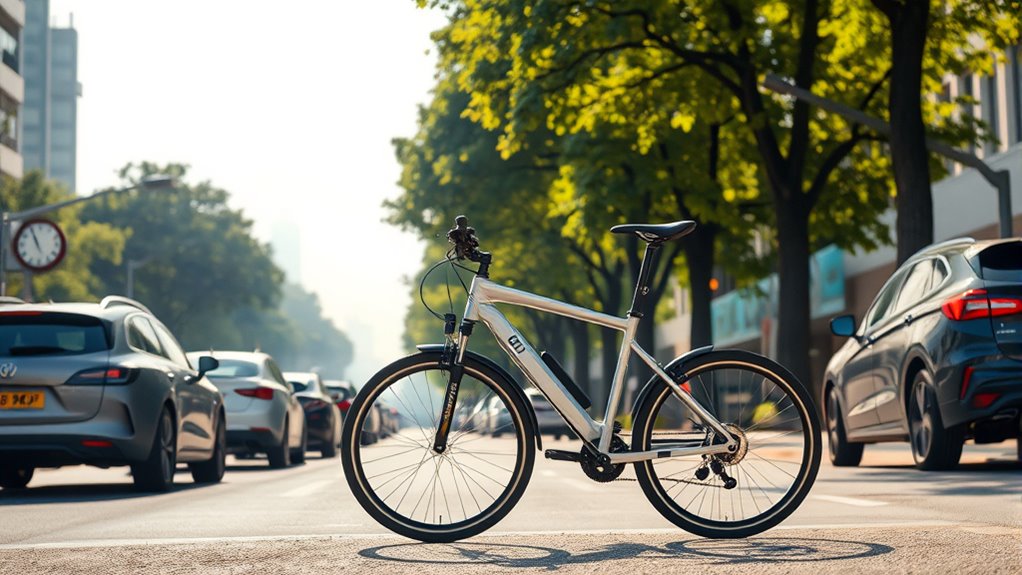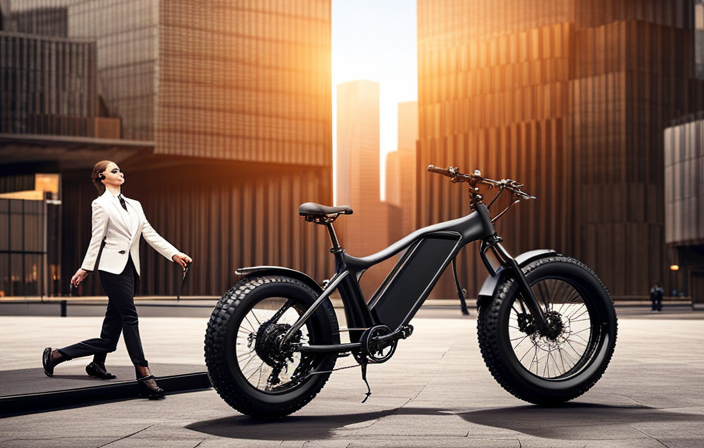Electric bikes considerably lower your environmental impact compared to cars. They use fewer resources in manufacturing—requiring less raw material and energy—and emit much less CO₂ during production and operation. During use, they consume far less energy and produce minimal emissions. Plus, they help reduce urban congestion and pollution, improving city air quality. If you want to understand how these benefits come together and what else makes e-bikes eco-friendly, keep exploring the details.
Key Takeaways
- E-bikes have significantly lower lifecycle emissions (134-165kg CO₂e) compared to cars (5.5-13 tons).
- Manufacturing e-bikes uses about 81 times less energy and fewer raw materials than cars.
- During use, e-bikes consume minimal energy (0.1-0.2 kWh/km) and produce negligible emissions.
- High recyclability (~95%) of e-bike components reduces environmental impact over their lifespan.
- E-bikes help reduce urban congestion and air pollution, improving public health and supporting sustainable cities.
Manufacturing Footprint: Resources and Energy Used

Manufacturing an e-bike requires considerably less resources and energy than building a car. Your manufacturing footprint is smaller because it uses fewer raw materials like metals and plastics, which reduces overall material consumption. The energy used in producing an e-bike is notably lower—about 81 times less—mainly due to its lighter weight and simpler production process. Lithium-ion batteries, essential for e-bikes, produce around 59-129 kg CO2-eq per kWh, with emissions depending on the electricity source. Higher recycling rates for e-bike components, especially batteries at around 95%, help lower environmental impact. Additionally, the use of low-impact office plants can contribute to improved indoor air quality and reduce the need for mechanical air filtration. By using fewer resources and less energy, e-bike manufacturing results in lower carbon emissions and a smaller environmental footprint, making it a more sustainable choice compared to traditional cars.
Lifecycle Emissions: From Production to Recycling

Since e-bikes require considerably less energy and produce fewer emissions during their entire lifecycle, they are a more environmentally friendly transportation option. Their lifecycle emissions, from production to recycling, are markedly lower than those of cars. Manufacturing an e-bike involves less resource use and results in a smaller carbon footprint—around 134-165kg CO₂e—compared to cars’ 5.5 to 13 tons. The materials used in e-bike components, mainly metals, are more recyclable, boosting recyclability rates to about 95%. Lithium-ion batteries, a key part of e-bikes, are highly recyclable, reducing environmental impact further. Additionally, the use of sustainable materials in manufacturing can further decrease environmental footprints. Incorporating renewable energy sources during manufacturing processes can further enhance sustainability. Overall, the lower resource consumption during manufacturing and the efficient recycling process make e-bikes a sustainable choice with minimal lifecycle emissions. Additionally, advancements in AI-driven analytics can help optimize supply chains and manufacturing processes to further reduce environmental impacts. Furthermore, the development of recycling technologies enhances the ability to recover valuable materials, reducing the need for virgin resource extraction.
Energy Consumption During Use and Operational Impact

E-bikes stand out for their exceptional energy efficiency during use, consuming only about 0.1 to 0.2 kWh of electricity per kilometer—much less than cars, which typically use 0.6 to 0.7 kWh per km. This low energy consumption directly reduces their operational impact and carbon footprint. With high battery efficiency, electric bikes convert a larger portion of energy into movement, resulting in minimal CO₂ emissions—around 1-2 g per km even when powered by fossil fuels. Additionally, many models incorporate advanced energy management systems to optimize power use and extend battery life. The performance tuning of e-bikes can further enhance their efficiency and sustainability during operation. Proper battery maintenance can also increase the lifespan and performance of e-bike batteries, contributing to overall sustainability. Research indicates that battery recycling methods are improving, reducing environmental concerns associated with battery disposal. Compared to cars, their energy use is notably lower, leading to a smaller environmental impact during operation. This efficiency not only cuts emissions but also makes e-bikes a more sustainable choice for daily transportation, emphasizing their advantage over traditional vehicles in reducing overall emissions and energy consumption. Additionally, the use of beneficial ingredients like collagen and hyaluronic acid in certain products demonstrates how eco-friendly innovations can improve both performance and sustainability.
Environmental and Urban Benefits of E-Bikes

Electric bikes offer notable urban advantages by occupying considerably less space than cars, which helps reduce congestion and makes better use of limited land resources. This efficiency supports sustainable transport and improves the urban environment. By replacing cars, e-bikes lower emissions and air pollution, leading to better public health. Their smaller size reduces traffic congestion and energy consumption, contributing to a lower carbon footprint. E-bikes also promote healthier lifestyles through physical activity, further benefiting public health. Consider the following:
| Benefit | Impact |
|---|---|
| Land use | More efficient urban planning |
| Air pollution | Reduced respiratory illnesses |
| Emissions | Climate change mitigation |
Using e-bikes enhances urban livability and supports sustainable development. Additionally, e-bikes contribute to reducing the environmental impact of urban transportation by decreasing reliance on fossil fuels and lowering noise pollution. Furthermore, the adoption of e-bikes can encourage public transportation integration, making urban mobility more seamless and environmentally friendly. Embracing e-bike technology also fosters urban sustainability by reducing the overall ecological footprint of city travel. A shift towards e-bikes also can lead to urban congestion reduction, improving overall city life quality.
Comparing Broader Societal and Ecological Impacts

Compared to conventional cars, electric bikes produce considerably lower lifecycle emissions—around 21-25 grams of CO2e per kilometer versus approximately 130 grams for cars—making them a more sustainable transportation option. By switching to e-bikes, you can markedly reduce your carbon footprint and emissions produced, helping to lessen air pollution in urban areas. Their lower energy consumption and smaller ecological footprint foster a positive environmental impact, supporting climate change mitigation efforts. Widespread adoption of electric bikes promotes sustainable urban development by decreasing traffic congestion and reducing land use for parking and infrastructure. This shift not only benefits public health but also contributes to cleaner air and healthier city environments, aligning personal transportation choices with broader societal and ecological goals. Additionally, promoting ethical hacking practices can enhance cybersecurity measures that protect environmentally sensitive data and infrastructure involved in sustainable initiatives. Emphasizing lifecycle emissions helps consumers and policymakers better understand the full environmental impact of transportation options beyond just operation.
Frequently Asked Questions
Are Electric Bikes Better for the Environment Than Cars?
You’re wondering if electric bikes are more eco-friendly than cars. The answer is yes. Electric bikes produce far fewer emissions, with only 21-25 grams of CO2 per km, compared to 130 grams for cars. They also use much less energy to produce and operate, especially if powered by renewable energy. Plus, their batteries are recycled at higher rates, making e-bikes a smarter, greener choice for transportation.
Is a Bike Better Than a Car for the Environment?
You might think a bike isn’t practical, but for the environment, it’s far better than a car. Biking produces zero emissions during use, and manufacturing one emits 81 times less CO2 than a car. When you ride an e-bike, your emissions are minimal—just 1-2 grams per km. Over time, this helps reduce your carbon footprint considerably, making biking a smarter, greener choice than driving.
What Is the Carbon Footprint of the Ebike?
You’re wondering about the carbon footprint of an e-bike. During manufacturing, it ranges from about 134kg to 165kg of CO2e, mainly from batteries. Over its lifetime, it emits around 21-25g of CO2 per km, much lower than a car’s 130g. Plus, high recycling rates help reduce its overall environmental impact, making e-bikes a greener transportation choice.
What Are the Disadvantages of Ebikes?
While e-bikes offer a greener ride, they do have some downsides. You might find that their batteries wear out faster than you’d hope, especially without proper care, leading to more frequent replacements. The motors also tend to have a shorter lifespan, requiring more maintenance. Overheating and improper charging can speed up wear, so you’re better off staying attentive to battery health to keep your e-bike running smoothly longer.
Conclusion
Just like a gentle breeze can clear a storm, choosing e-bikes over cars can markedly reduce your environmental footprint. They require fewer resources to manufacture, emit fewer emissions during use, and promote healthier cities. By switching to e-bikes, you’re not only cutting down your personal impact but also helping create a cleaner, greener world. Every ride on an e-bike is a small step toward a more sustainable future—simple, yet powerful, like a ripple spreading outward.









